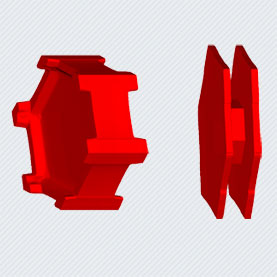 |
| A MULTIFACETED PROBLEM: Realistically simulating the growth of snowflakes has proved a huge challenge. Above, two examples of faceted snowflake structures. Image: Barrett/Garcke/Nürnberg |
Scientists as far back as Johannes Kepler have pondered the mystery of snowflakes: Their formation requires subtle physics that to this day is not well understood. Even a small change in temperature or humidity can radically alter the shape and size of a snowflake, making it notoriously difficult to model these ice crystals on a computer. But after a flurry of attempts by several scientists, a team of mathematicians has for the first time succeeded in simulating a panoply of snowflake shapes using basic conservation laws, such as preserving the number of water molecules in the air.
Kind of late for this article, but it was a very mild winter in the northeast. To next winter:
 |
| 1000 Awesome Things |
Scientific American: Snowflake Growth Successfully Modeled from Physical Laws
Comments